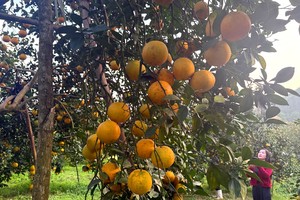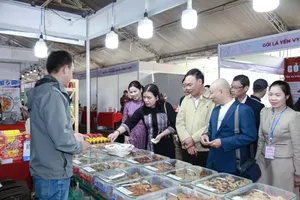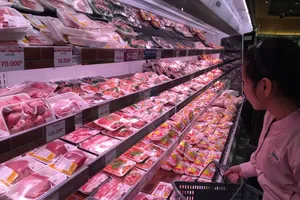The ministry said that the Department of Animal Health under the Ministry of Agriculture and Rural Development (MARD) is the agency that grants the quarantine certificate for imported livestock products. By the end of February, Vietnam imported 65,865 tons of meat, of which pork and pork products reached 13,816 tons, accounting for 21 percent of total imported meat, an increase of 150 percent compared to the same period last year.
The structure of pork cuts imported into Vietnam mainly included pork chop, bacon, leg, hock, and bone. Of which, pork imported from Canada accounted for 33.1 percent; from Germany 25.4 percent; from Brazil 16.1 percent; from Poland 15.8 percent; from the US 7.8 percent.
Pork imported into Vietnam is currently in the scope of the most favored nation tariffs of 10 percent for frozen meat, and 25 percent for fresh and chilled meat. As for countries that already have free trade agreements with Vietnam, such as Australia, New Zealand, Japan, Russia, and Mexico, the import tariffs are ranging from 3 percent to 21 percent.
The MoIT noted that according to the current regulations, pork is not in the list of products imported under the license of the MoIT but under the guidance of the MARD.
Currently, the MARD has signed a bilateral agreement on technical and animal quarantine with 19 countries. Enterprises from these 19 countries are only able to export pork and pork products into Vietnam when the MARD gives permission.
The Import-Export Department sent an urgent official dispatch, asking rice export enterprises to earnestly implement the regulations in the Decree No.107/2018/ND-CP on stockpiling, circulating, and stabilizing the domestic prices of paddy and commodity rice.
Since the beginning of this year, the developments of the world’s situation have been rapid and unpredictable. The global development of rice trade continues to arise, affecting significantly rice exports of Vietnam. To ensure the objectives and the principles in rice export management and to have measures to cope with the price risks, the department asked enterprises to maintain the minimum stocking of rice at 5 percent of the total amount of rice that they exported in the past six months. They are responsible for organizing a rice distribution system, providing immediately their rice inventory and stocking to stabilize the domestic market under the direction of the competent State agencies.
The structure of pork cuts imported into Vietnam mainly included pork chop, bacon, leg, hock, and bone. Of which, pork imported from Canada accounted for 33.1 percent; from Germany 25.4 percent; from Brazil 16.1 percent; from Poland 15.8 percent; from the US 7.8 percent.
Pork imported into Vietnam is currently in the scope of the most favored nation tariffs of 10 percent for frozen meat, and 25 percent for fresh and chilled meat. As for countries that already have free trade agreements with Vietnam, such as Australia, New Zealand, Japan, Russia, and Mexico, the import tariffs are ranging from 3 percent to 21 percent.
The MoIT noted that according to the current regulations, pork is not in the list of products imported under the license of the MoIT but under the guidance of the MARD.
Currently, the MARD has signed a bilateral agreement on technical and animal quarantine with 19 countries. Enterprises from these 19 countries are only able to export pork and pork products into Vietnam when the MARD gives permission.
The Import-Export Department sent an urgent official dispatch, asking rice export enterprises to earnestly implement the regulations in the Decree No.107/2018/ND-CP on stockpiling, circulating, and stabilizing the domestic prices of paddy and commodity rice.
Since the beginning of this year, the developments of the world’s situation have been rapid and unpredictable. The global development of rice trade continues to arise, affecting significantly rice exports of Vietnam. To ensure the objectives and the principles in rice export management and to have measures to cope with the price risks, the department asked enterprises to maintain the minimum stocking of rice at 5 percent of the total amount of rice that they exported in the past six months. They are responsible for organizing a rice distribution system, providing immediately their rice inventory and stocking to stabilize the domestic market under the direction of the competent State agencies.
























